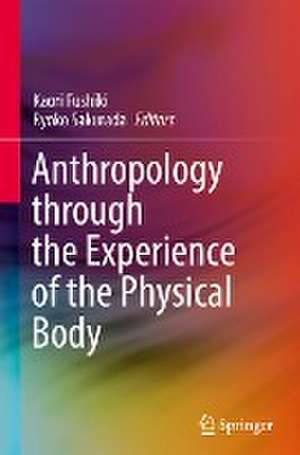Anthropology through the Experience of the Physical Body
Editat de Kaori Fushiki, Ryoko Sakuradaen Limba Engleză Hardback – 24 dec 2023
Preț: 721.18 lei
Preț vechi: 879.49 lei
-18% Nou
Puncte Express: 1082
Preț estimativ în valută:
138.09€ • 142.45$ • 114.45£
138.09€ • 142.45$ • 114.45£
Carte tipărită la comandă
Livrare economică 21 februarie-07 martie
Preluare comenzi: 021 569.72.76
Specificații
ISBN-13: 9789819957231
ISBN-10: 9819957230
Pagini: 150
Ilustrații: XIII, 150 p. 14 illus., 7 illus. in color.
Dimensiuni: 155 x 235 mm
Greutate: 0.41 kg
Ediția:1st ed. 2023
Editura: Springer Nature Singapore
Colecția Springer
Locul publicării:Singapore, Singapore
ISBN-10: 9819957230
Pagini: 150
Ilustrații: XIII, 150 p. 14 illus., 7 illus. in color.
Dimensiuni: 155 x 235 mm
Greutate: 0.41 kg
Ediția:1st ed. 2023
Editura: Springer Nature Singapore
Colecția Springer
Locul publicării:Singapore, Singapore
Cuprins
Chapter 1 Introduction: Experiences of the Physical Body.- Part I Body and Space.- Chapter 2 The Social Body of Women: Patriarchal Ideology and Women-centred Kin Networks among Chinese Households in Malaysia.- Chapter 3 A Body Out of Place: Pollution and Pregnancy of Hakka Chinese in Sarawak, Malaysia.- Part II Imperfect Bodies: Communication and the Body as Media.- Chapter 4 The Embodiment of the Deaf in Japan: A Set of Heuristic Models for Identity, Belonging and Sign Language Use.- Chapter 5 Playing about with Our Imperfect Bodies: Representations of Physical ‘Disability’ in Balinese Mask Drama Topeng.
Notă biografică
Fushiki Kaori is a professor at the Department of Humanities, Taisho University, Japan. Her expertise lies in the fields of cultural anthropology, organology, ethnomusicology, theatre studies and religious studies. Her research interests cover the performing arts in Singapore, Malaysia and Indonesia, especially Balinese gamelan and glove puppet theatre (wayang potehi) and Chinese rituals related with those performing arts in Singapore. She has published extensively on these topics. Her publications, as a co-editor, include Potehi: Glove puppet theatre in Southeast Asia and Taiwan (2016). She is currently undertaking research on the untold and unseen skills and knowledge of performance acts and the making of musical instruments as a member of a cultural anthropology research group that focuses on the acquisition and developmental processes associated with skills, proficiency and tacit knowledge.
Ryoko Sakurada is a lecturer of social and cultural anthropology at the Ikuei Junior College's Modern Communication Department in Japan.
Ryoko Sakurada is a lecturer of social and cultural anthropology at the Ikuei Junior College's Modern Communication Department in Japan.
Textul de pe ultima copertă
This book seeks to break new ground, both empirically and conceptually, in examining changing understandings of the physical human body from a variety of anthropological perspectives. In doing so, it interrogates how the body has been and continues to be conceptualised, experienced and interacted with. After an introductory appraisal of recent approaches to understanding the body, the book provides empirically rich accounts from East and Southeast Asia of how cultural, environmental and social norms shape human physicality. The contributions are organised in four broad themes. Part I, ‘Body and Space’, offers two contrasting case studies from Malaysia, both of which examine gender norms associated with marriage and pregnancy, including the taboos associated with these rites of passage. Part II, ‘Imperfect Bodies: Communication and the Body as Media’, analyses two case studies—Deaf people in Japan and masked theatre performance in Bali, Indonesia, to reflect on changing attitudes towards disability, which reflect broader social norms and cultural beliefs about the nature of disability and its place in society. Part III, ‘The Body and Image’, provides a pair of case studies from Singapore, on male fans of the popular manga boys’ love genre and on ways that the Chinese zodiac system is determined from birth and continues to be spiritually embedded in the body of a Chinese individual through ritual practices. Part IV, ‘The Body as Container: Taming the Bodies?’, presents a single case study from Thailand of spirit possession among schoolchildren. Though wide-ranging, all the case studies posit that the body is a site of constant negotiation. The way the body is presented and the way it is seen are shaped by a complex array of social, cultural, political and ideational factors. Anthropology through the Experience of the Physical Body is a valuable interdisciplinary work for advanced students and researchers interested in representations of the body in East and Southeast Asia and for those with wider interests in the field of critical anthropology.
Caracteristici
Approaches the study of the body—how it is conceptualized and experienced—from an anthropological perspective Provides empirically rich accounts from Asia of how cultural, environment, and social norms shape human physicality Contributes to comparative studies of cultural variations in bodily practices
